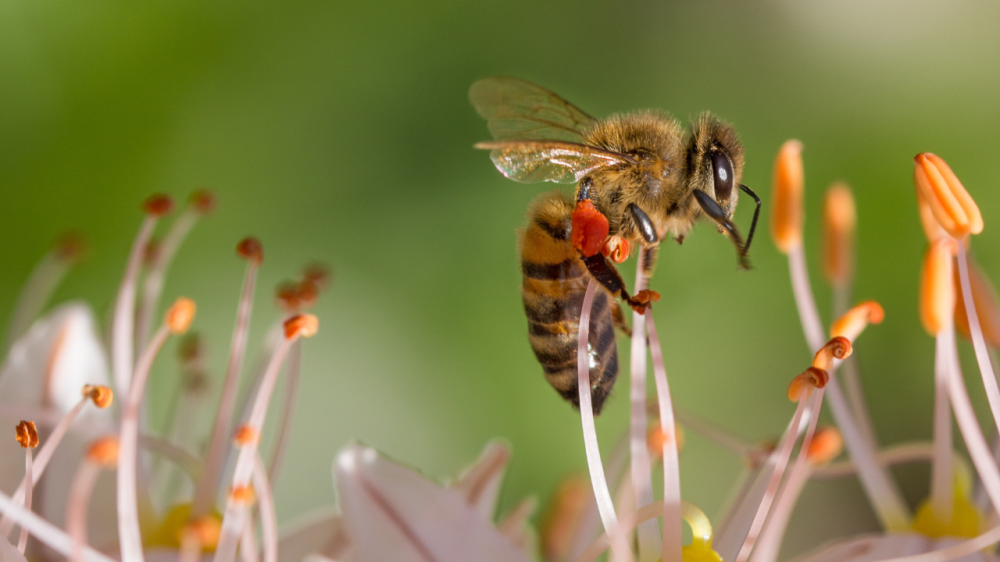Want to learn more about the benefits of pollen?
In this era, pollen is emerging as an important nutritional component in confronting the health challenges facing the world today.
This made us wonder, how can these simple foodstuffs carry with them protection against many serious diseases?!
Let's not talk for a long time and take a deep dive into this secret that lies in pollen.
We will first begin by quickly learning about…
What is pollen?
Pollen is a valuable nutrient that bees collect only from the flowers of male plants and make food for the queen and the entire colony.
Bees pick up plant pollen from these flowers and it sticks to their legs and forms small clumps called pollen, which they can use as a rich source of nutrients.
The bees store these grains in the cells of the hive and add honey to them so that we have raw, natural honey.
It is also important to know that these grains are a rich source of proteins, vitamins and minerals, and have huge health benefits for humans.
So let's get to know some of these benefits...
You may also like: Benefits of royal jelly (scientific evidence)
What are the benefits of pollen?
1- A good anti-inflammatory
According to some recent studies, pollen contains anti-inflammatory substances, which makes it useful in significantly reducing swelling and tissue irritation.
In addition, some research indicates that eating pollen may help reduce allergy and asthma symptoms in some people.
But it is important to emphasize that some people are actually allergic to these pills, so make sure you do not have any type of allergy to them first before taking them.
If you experience any allergic symptoms, you should stop taking it immediately and consult a doctor.
2- Improving skin health
Thanks to the effects of vitamins and antioxidants in pollen, it can contribute to improving the appearance of the skin and increasing its freshness and health.
Pollen can help improve skin health by:
- Improving its elasticity and overall appearance.
- Protects the skin, enhances its color and radiance, and reduces wrinkles as it contains antioxidant compounds.
- Soothe inflammation.
- Improve skin hydration.
But it is always better to do an allergy test before using pollen.
3- It may help strengthen immunity
Pollen is a good nutritional component and a source of energy, as it can help improve activity and vitality.
as Some studies have also shown that eating pollen can enhance the body's immunity and contribute to strengthening it.
This is because pollen:
- It contains a good amount of vitamins, minerals and antioxidants.
- Helps stimulate the production of antibodies.
- It contributes to enhancing the functions of white blood cells.
4- Rich in antioxidants
Pollen contains a large group of antioxidants, such as flavonoids and carotenoids, which contribute to protecting cells from damage resulting from oxidation.
In addition, it contributes greatly to protecting your body from any diseases that may be caused by free radicals.
Not only that, but it also helps reduce the severity of chronic inflammation .
5- A rich source of protein and vitamins
Pollen is a truly impressive nutritional supplement because it contains more than 250 active substances, including:
- 35% proteins, which are a basic structure of tissues and cells in the body.
- A wide range of vitamins, such as vitamin B and vitamin C, which are essential for the body’s health and functions.
- 40% carbohydrates, which are a primary source of energy.
- Vitamins, minerals and enzymes.
6- It may contribute to preserving the liver
The liver is the main organ in keeping the human body free of toxins, along with approximately 500 other functions that it performs.
Therefore, it is natural that it becomes one of the most important organs of the body that we must strive to preserve.
Therefore, studies began to search for natural materials that help protect and preserve it.
Pollen is one of those components that some studies have indicated that consuming it periodically has a major and effective role in protecting this organ from damage , and sometimes it may even help in the recovery of its damaged cells.
7- A pain reliever for some women
Research has proven that pollen has many benefits regarding women’s health, especially since some women suffer from anemia and stress, and feel pain, discomfort, and severe sleep and mood disturbances.
Pollen here may contribute to reducing these pains, especially the pain associated with the menstrual cycle .
But it may also help:
- Alleviating pain resulting from menopause.
- Regulating ovarian functions.
8- Improving digestive system functions
One of the benefits of pollen indicated by some studies is that it effectively helps in solving stomach and digestive system problems .
whereas:
- The fiber found in pollen aids bowel movement and promotes healthy digestion.
- Digestive enzymes help break down food and facilitate digestion.
- Supports digestive functions, due to both vitamin B and zinc.
- It contains probiotics to enhance the balance of beneficial bacteria in the digestive system.
- It contributes to reducing irritation and inflammation in the stomach and intestinal wall.
9- Improving the sexual health of couples
In folk medicine and traditions in many countries, pollen is known to be one of the natural ingredients that increases a man's sexual ability and improves his sexual performance.
But what about science? Do experiments and studies confirm this popular information?
After analyzing and reviewing more than one study to find out the benefits of pollen and its effect on sexual health, we found the following:
- Pollen may contribute to improving reproductive ability , improving sperm production in the male, and also reducing oxidative stress, which leads to cell damage.
- It may protect against testicular cell damage in men who take it with MTX.
- Another study indicated its role in improving fertility in women and men.
- Another pooled study cited pollen as one of the ingredients that may help reduce many of the symptoms of PCOS in women.
These were the most important benefits of pollen, but what about its harms?!
Let us now move on to quickly learn about…
What are the harmful effects of pollen?
Generally, pollen is considered safe for most people when taken in appropriate amounts.
However, some harm or side effects may appear in some cases.
Here are some points to consider:
- Allergies : Some people are sensitive to pollen, and eating it may cause symptoms as a result of the allergy, such as skin rash, redness, itching, or irritation. If any of these symptoms appear, you should stop taking the pollen and speak to your doctor immediately.
- Interaction with medications : Caution should be exercised if taking any other medications or nutritional supplements, as an interaction may occur between pollen and some medications, which affects the effectiveness of the medications or increases the risk of side effects.
- Interaction with certain medical conditions : It is preferable not to use pollen if you have special health conditions, such as pregnancy or breastfeeding.
- Weight gain : Some people may feel a weight gain due to taking pollen, but this depends on the composition of the product and the quantities consumed.
At the end of our article, we hope that you have learned about the most important benefits of pollen, which have been shared by scientific experiments and studies in recent times.
If you have any questions, contact us without hesitation.

